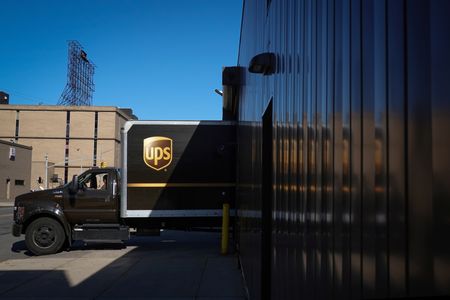 1
1 1
1
By Lisa Baertlein
LOS ANGELES (Reuters) – United Parcel Service (UPS) union employees have voted overwhelmingly to authorize a strike should contract talks break down after the current agreement ends in two weeks, the International Brotherhood of Teamsters said on Friday.
The Teamsters, representing some 340,000 UPS workers in the United States, said 97% of voting members approved the strike authorization, “giving the union maximum leverage to win demands at the bargaining table.”
The vote comes during relatively cordial talks as new Teamsters General President Sean O’Brien works to get a UPS deal that shares billions of dollars of its pandemic profit with workers and helps to recruit new members – including Amazon.com warehouse staff.
UPS again on Friday said it is confident that the two sides will reach an agreement that provides wins for all involved.
“The results do not mean a strike is imminent and do not impact our current business operations in any way,” the company said.
UPS shares fell as much as 1.5% after the news but quickly pared losses to trade down 0.6% in midday trade.
The company and the union already have agreements on issues such as adding air conditioning in new delivery trucks. But talks continue on wages, a crucial issue.
Jeremy Tancredi, a former UPS manager turned industry consultant, expects the Teamsters to win a “healthy” raise without having to resort to a work stoppage.
“There is money out there to (pay for the) increase,” Tancredi said, adding that the lift would not be “crazy drastic” or stressful to UPS.
There is precedent for significant wage increases.
U.S. freight railroad workers secured a 24% contract pay increase. Unions and FedEx reached a tentative deal that would give pilots for the delivery company a 30% raise. And the union and employers for U.S. West Coast port workers this week struck a tentative deal that includes a 32% pay increase and a one-time “hero” bonus.
Tancredi, a partner at consultancy West Monroe, said interdependence between the Teamsters and UPS reduces strike risk. That is because UPS management sells Teamster professionalism and teamwork as a strength over competitors, and the Teamsters count UPS as its largest employer at a time when union membership is struggling to grow, Tancredi added.
Still, employees told Reuters that Teamsters members are unified and would stop work if the company balks at raises that reflect the time and health risks they took to manage the COVID-19 pandemic-related cargo surge or their value to the company.
“We were working basically Christmas hours for two years straight” during the pandemic, when e-commerce surged, said Rikki Schreiner, a full-time UPS employee in Eagan, Minnesota.
UPS was more profitable than FedEx during the pandemic when animosity between that rival and its lower-cost delivery contractors festered.
“They get what they pay for,” Schreiner said of UPS, adding that company delivery drivers, who make about $150,000 annually including base pay and benefits before overtime, “earn it.”
(Reporting by Lisa Baertlein in Los Angeles and Shivansh Tiwary in Bangalore; Editing by Jamie Freed and Will Dunham)